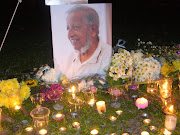A Nov 07 video from sg human rights,
Singapore opposition leader fined for public speech
SINGAPORE, May 30 - A bankrupt Singapore opposition party leader was sentenced to five weeks in prison or pay a S$5,000 fine for speaking in public without a permit.
Chee Soon Juan, leader of the Singapore Democratic Party, was on Friday found guilty of the offence committed on April 8, 2006. He has six outstanding charges of speaking in public without a license between November 2005 and April 2006.
Singapore has tough laws on public gatherings, and protests are rare. An assembly of five or more people requires a police permit and offences under the Public Entertainments and Meetings Act could lead to fines as high as S$10,000 .
Chee, who pleaded not guilty on the grounds of his constitutional right to free speech, was made a bankrupt in February 2006 when he failed to pay libel damages of S$500,000 to former prime ministers Lee Kuan Yew and Goh Chok Tong.
"I continue to maintain that what I have done is well within the law and my constitutional rights," Chee told the court. Chee's lawyer M. Ravi said he will be appealing the conviction.
The state prosecutor had asked for a "substantial fine" to act as a deterrent for other "like-minded" individuals.
The Southeast Asian city defends its strict laws on public assembly citing the need for public order and safety.
The Singapore Democratic Party is one of the more vocal opposition parties in Singapore. It did not get into parliament in the last election in 2006 and 82 of the 84 elected parliamentary seats are held by the ruling People's Action Party which has been in power since Singapore's independence in 1965.
Chee has also been found guilty of defamation in cases filed by former prime minister Lee Kuan Yew and his son, Prime Minister Lee Hsien Loong. Singapore's high court has yet to rule on the amount of damages.
(Reporting by Melanie Lee; Editing by Jan Dahinten and Sanjeev Miglani)
Last post here
16 years ago

























